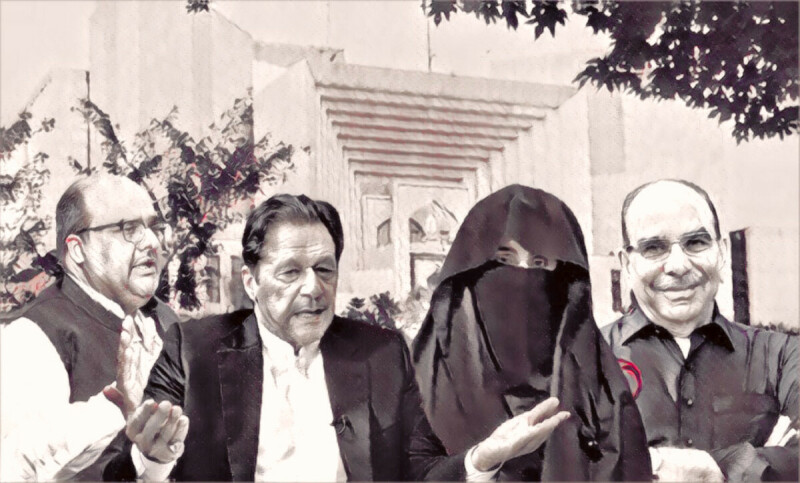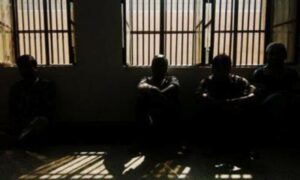“The problem with trials such as this is the perception of victimisation that denudes it of it’s legitimacy,” said lawyer Basil Nabi Malik.
Former prime minister Imran Khan and his wife, Bushra Bibi, were sentenced on Friday to 14 and seven years in prison, respectively, in the £190 million Al-Qadir Trust case.
The verdict, announced by Justice Nasir Javed Rana at a makeshift courtroom in Adiala Jail, also imposed fines of Rs1 million on Khan and Rs500,000 on Bibi, with an additional six-month jail term for non-payment.
The case, centred on allegations of misappropriating funds returned to Pakistan by the UK, has seen multiple delays in the announcement of the verdict, fuelling speculation and controversy. With the verdict now finally in the field, here is what the legal fraternity had to say about it.
What about the others?
For lawyer Abdul Moiz Jaferii, “of all the allegations against Imran Khan, this was the one that held substance.” He said that there was “clearly a misuse of authority by the prime minister to allow the illegitimate proceeds of Malik Riaz, seized by the UK, to be used to satisfy a pre-existing penalty in the Supreme Court.”
“This was to become part of the public kitty and instead in a way it went back into Malik Riaz’s pocket.”
According to Jaferii, Imran Khan was the prime minister at the time, and his cabinet approved such a transfer, albeit without any transparency. “It is not sufficient for him to justify this by claiming his motives were charitable and that the quid pro quo he received was for the betterment of the poor,” he said.
“However, even when there is a case to answer, the process and method adopted by the state and judiciary reduce it to a farce. The fact that nothing has been said or done about the principal beneficiary, Malik Riaz, and the lack of explanation about everyone else’s roles makes it abundantly clear that this decision is motivated by factors other than a quest for justice.”
Will history repeat itself?
According to lawyer Mirza Moiz Baig, the judgment demonstrates that the PTI Chief’s legal woes are far from over.
“While the Al-Qadir Trust case engenders a number of questions regarding the former prime minister’s proximity with a real-estate baron, the manner in which the cabinet rubber stamped the transaction even as it was kept in the dark, and conflict of interest, it would be remiss to not acknowledge that the standard of proof in criminal cases — beyond reasonable doubt — is often submerged in cases concerning opposition leaders,” said Baig.
“Given our history of such verdicts failing to pass muster when appealed before the high courts, it would be interesting to see whether this decision withstands the high court’s scrutiny or whether history will repeat itself,” he added.
What about the students?
PTI’s Barrister Taimur Malik, meanwhile, questioned the veracity of the verdict, adding that it would be adjudicated by the high court in appeal. He stressed, however, that the federal government would have to ensure that the “academic status of Al Qadir Uni students isn’t disturbed”.
Perceptions matter
“The problem with trials such as this is the perception of victimisation that denudes it of it’s legitimacy,” said lawyer Basil Nabil Malik. “It doesn’t matter how true or correct the sentence or verdict is; the fact that it is arising in a climate of fear, oppression, and vendettas, would make certain that the verdict, irrespective of its reasoning, would be seen as motivated and unfair.”
“This is perhaps why it is said that justice should not only be done, but should be seen to be done,” he added.
Credibility on the line
For lawyer Ayman Zafar, these convictions come as no surprise — “after all, Pakistan has a well-documented tradition of ensuring that no elected leader walks away unscathed.”
“Disqualifications, imprisonments, and forced exiles have become rituals, repeated with such precision that they now seem less like law enforcement and more like political choreography. Our history is not one of stable governance but of carefully curated instability, where leaders are prosecuted not for their crimes, but for their time in office.”
But beyond the predictability of it all, the real question remains: “Is there actual substance behind this conviction, or is this just another round of political theatre?” Zafar questioned. Legally, Khan and Bushra Bibi have the right to appeal before a higher court, where they can also seek suspension of their sentences. Whether the court grants relief will depend on the strength of the evidence — or lack thereof.
According to Zafar, the state needs to carefully take a look at what happens next. “If history is an indicator, the state’s response to any possible fallout will be as ill-conceived as the conviction itself,” she added.
“The handling of Khan’s appeal will be a test for judicial impartiality. The higher courts now have a choice: apply the law fairly or allow political expediency to dictate justice. The credibility of the legal system is on the line, and Pakistan’s future as a functional democracy depends on it.”
“Or perhaps, democracy was never really the plan to begin with,” she added.
- Desk Reporthttps://foresightmags.com/author/admin/September 25, 2024











